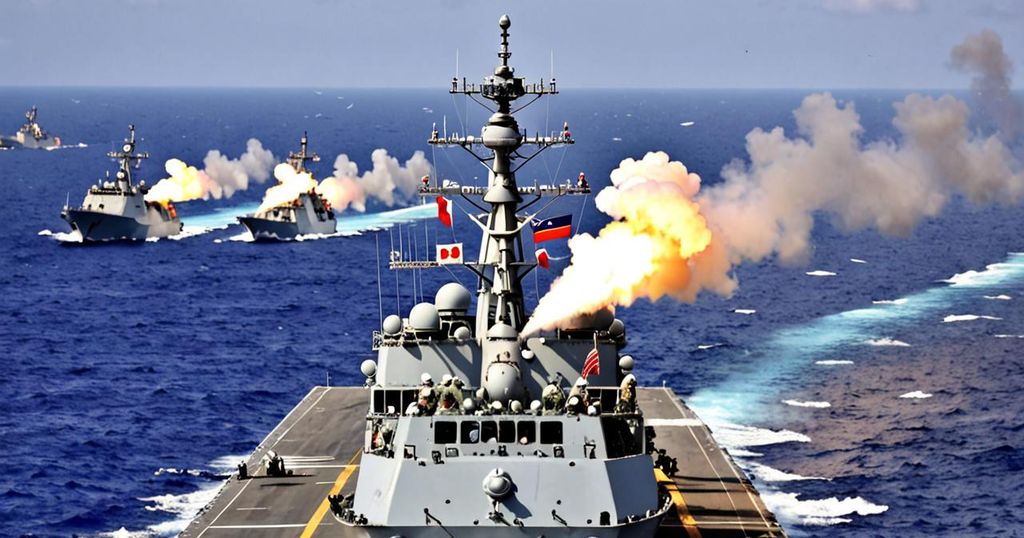Vietnam and Philippines Team Up For Naval Drills in South China Sea
Vietnam has recently collaborated with the Philippines to conduct joint military exercises in the South China Sea, a strategic move to counter China’s increasing assertiveness in the region. This collaborative effort aims to strengthen bilateral relationships and establish a unified stance on territorial claims, a crucial step for both countries as they face the looming threat posed by Beijing’s aggressive actions in the disputed waters.
Amidst conflicting territorial claims, Vietnam’s coast guard ship made a goodwill visit to Manila in early August, kicking off a four-day joint drill in the South China Sea. Despite their own disagreements over territorial boundaries in the area, Vietnam and the Philippines have chosen to set aside their differences and work together to address the larger challenge posed by China’s expansionist agenda. According to Ray Powell, the director of Stanford University’s Gordian Knot Center for National Security Innovation, this coordinated approach signifies a proactive effort to manage bilateral disputes amicably and present a united front against China’s overwhelming dominance.
The escalating tensions in the South China Sea stem from China’s unfounded territorial claims outlined in its controversial nine-dash line, encroaching on the sovereign rights of neighboring countries. Notably, in a blatant display of aggression, China’s coast guard fired water cannons at a Philippine vessel patrolling near the disputed Scarborough Shoal. These provocative actions have prompted international outcry, emphasizing the urgent need for a unified response to counter China’s overbearing tactics.
Furthermore, China’s encroachment into Vietnam’s exclusive economic zone (EEZ) has exacerbated the standoff, as it continues to assert its dominance through intrusive coast guard patrols and oceanographic surveys. Powell notes that while Vietnam’s joint drill with the Philippines may yield limited military benefits, it carries powerful symbolic significance by exemplifying responsible cooperation in the peaceful resolution of maritime disputes.
In order to effectively challenge China’s territorial ambitions, Vietnam must first address its maritime boundaries with neighboring Southeast Asian nations and foster a cohesive approach in negotiations. Establishing a unified stance among Southeast Asian countries and presenting a singular front to China is paramount to counter the formidable threat posed by Beijing’s expansionist endeavors.
Despite attempts to settle territorial disputes, the persistent issue of illegal fishing remains a point of contention and has significantly impacted Vietnam’s marine economy. The prevalence of illegal, unreported, and unregulated (IUU) fishing practices by Vietnamese fishermen has prompted international scrutiny, with the European Commission issuing a public warning regarding Vietnamese seafood in 2017. This concern has been exacerbated by reports of Vietnamese fishermen unlawfully entering Indonesian waters to conduct fishing activities, despite a 2022 agreement between Vietnam and Indonesia delineating their exclusive economic zones.
The challenges faced by the Vietnamese government in curbing illegal fishing practices are compounded by bureaucratic hurdles, diminishing marine ecosystems, and the economic motives driving fishermen to venture into disputed waters. It is imperative for Vietnam to address these longstanding issues and collaborate with neighboring nations to maintain sustainable fishing practices and mitigate the adverse impact on marine ecosystems and economies.
In conclusion, Vietnam’s joint military exercises with the Philippines and efforts to establish unified territorial claims underscore the imperative for Southeast Asian countries to forge a cohesive front in response to China’s aggressive actions. Collaborative initiatives to strengthen bilateral relationships and address contentious issues such as illegal fishing are pivotal steps toward ensuring regional stability and prosperity. By presenting a unified stance and fostering responsible cooperation, Vietnam and its Southeast Asian neighbors can effectively counter the territorial ambitions of China and safeguard their sovereignty in the South China Sea.








Post Comment